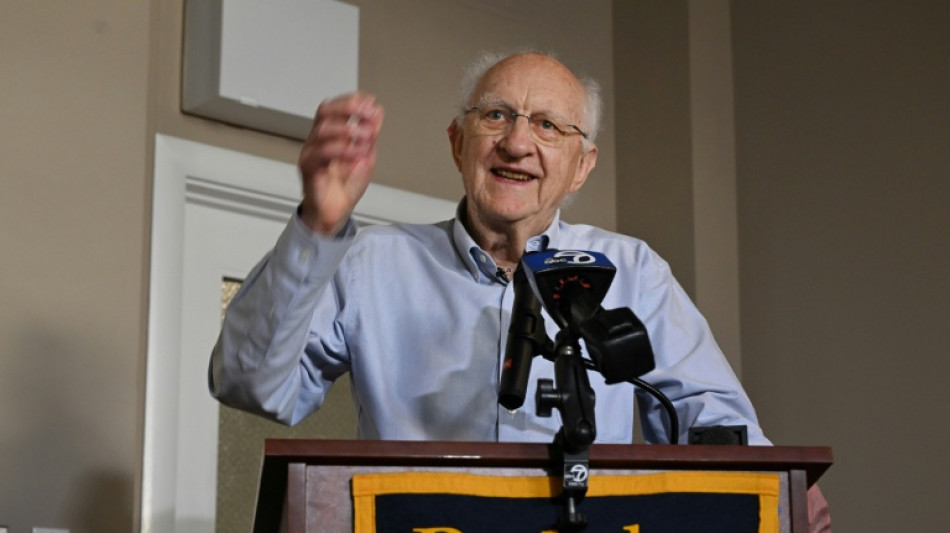
-
 Vonn to provide injury update as Milan-Cortina Olympics near
Vonn to provide injury update as Milan-Cortina Olympics near
-
France summons Musk for 'voluntary interview', raids X offices

-
 Stocks mostly climb as gold recovers
Stocks mostly climb as gold recovers
-
US judge to hear request for 'immediate takedown' of Epstein files

-
 Russia resumes large-scale strikes on Ukraine in glacial temperatures
Russia resumes large-scale strikes on Ukraine in glacial temperatures
-
Fit-again France captain Dupont partners Jalibert against Ireland

-
 French summons Musk for 'voluntary interview' as authorities raid X offices
French summons Musk for 'voluntary interview' as authorities raid X offices
-
IOC chief Coventry calls for focus on sport, not politics

-
 McNeil's partner hits out at 'brutal' football industry after Palace move collapses
McNeil's partner hits out at 'brutal' football industry after Palace move collapses
-
Proud moment as Prendergast brothers picked to start for Ireland

-
 Germany has highest share of older workers in EU
Germany has highest share of older workers in EU
-
Teen swims four hours to save family lost at sea off Australia

-
 Ethiopia denies Trump claim mega-dam was financed by US
Ethiopia denies Trump claim mega-dam was financed by US
-
Norway crown princess's son pleads not guilty to rapes as trial opens

-
 Russia resumes strikes on freezing Ukrainian capital ahead of talks
Russia resumes strikes on freezing Ukrainian capital ahead of talks
-
Malaysian court acquits French man on drug charges

-
 Switch 2 sales boost Nintendo profits, but chip shortage looms
Switch 2 sales boost Nintendo profits, but chip shortage looms
-
China to ban hidden car door handles, setting new safety standards

-
 Switch 2 sales boost Nintendo results but chip shortage looms
Switch 2 sales boost Nintendo results but chip shortage looms
-
From rations to G20's doorstep: Poland savours economic 'miracle'

-
 Russia resumes strikes on freezing Ukrainian capital
Russia resumes strikes on freezing Ukrainian capital
-
'Way too far': Latino Trump voters shocked by Minneapolis crackdown

-
 England and Brook seek redemption at T20 World Cup
England and Brook seek redemption at T20 World Cup
-
Coach Gambhir under pressure as India aim for back-to-back T20 triumphs

-
 'Helmets off': NFL stars open up as Super Bowl circus begins
'Helmets off': NFL stars open up as Super Bowl circus begins
-
Japan coach Jones says 'fair' World Cup schedule helps small teams

-
 Equities and precious metals rebound after Asia-wide rout
Equities and precious metals rebound after Asia-wide rout
-
Do not write Ireland off as a rugby force, says ex-prop Ross

-
 Winter Olympics 2026: AFP guide to Alpine Skiing races
Winter Olympics 2026: AFP guide to Alpine Skiing races
-
Winter Olympics to showcase Italian venues and global tensions

-
 Buoyant England eager to end Franco-Irish grip on Six Nations
Buoyant England eager to end Franco-Irish grip on Six Nations
-
China to ban hidden car door handles in industry shift

-
 Sengun leads Rockets past Pacers, Ball leads Hornets fightback
Sengun leads Rockets past Pacers, Ball leads Hornets fightback
-
Waymo raises $16 bn to fuel global robotaxi expansion

-
 Netflix to livestream BTS comeback concert in K-pop mega event
Netflix to livestream BTS comeback concert in K-pop mega event
-
Rural India powers global AI models

-
 US House to vote Tuesday to end shutdown
US House to vote Tuesday to end shutdown
-
Equities, metals, oil rebound after Asia-wide rout

-
 Bencic, Svitolina make history as mothers inside tennis top 10
Bencic, Svitolina make history as mothers inside tennis top 10
-
Italy's spread-out Olympics face transport challenge

-
 Son of Norway crown princess stands trial for multiple rapes
Son of Norway crown princess stands trial for multiple rapes
-
Side hustle: Part-time refs take charge of Super Bowl

-
 Paying for a selfie: Rome starts charging for Trevi Fountain
Paying for a selfie: Rome starts charging for Trevi Fountain
-
Faced with Trump, Pope Leo opts for indirect diplomacy

-
 NFL chief expects Bad Bunny to unite Super Bowl audience
NFL chief expects Bad Bunny to unite Super Bowl audience
-
Australia's Hazlewood to miss start of T20 World Cup

-
 Bill, Hillary Clinton to testify in US House Epstein probe
Bill, Hillary Clinton to testify in US House Epstein probe
-
Cuba confirms 'communications' with US, but says no negotiations yet

-
 Iran orders talks with US as Trump warns of 'bad things' if no deal reached
Iran orders talks with US as Trump warns of 'bad things' if no deal reached
-
From 'watch his ass' to White House talks for Trump and Petro


Nobel physics laureate says Trump cuts will 'cripple' US research
It was just past 2:00 am when a mysterious number rang Nobel laureate John Clarke, what he deemed "obviously a joke call" that grew increasingly surreal when he heard "a voice from Sweden."
"It soon became clear that it was real," Clarke told journalists Tuesday after he and two colleagues had won the Nobel Prize in physics for their door-opening work in quantum mechanics.
"I was just sitting there feeling completely stunned," Clarke said. "It had never occurred to me in my entire life that anything like this would ever happen."
The University of California, Berkeley professor said his phone kept ringing, emails began pouring in, and people started "banging on my door" seeking interviews at 3:00 am (1000 GMT).
"I said no thank you, not at this time of night," the British 83-year-old said with a chuckle.
Clarke shared the coveted prize with two fellow physicists who worked in his Berkeley lab at the time of the trio's research, Frenchman Michel Devoret and American John Martinis. All three scientists are researchers at American universities.
The physicist noted the significant resources he was afforded at the time of their work some four decades ago, including lab space, graduate assistants and equipment.
And he called US President Donald Trump's efforts to reshape American science and health policy -- including mass firings to government scientists and steep slashes to research budgets -- an "immensely serious problem."
"This will cripple much of United States science research," he told AFP, adding that he knew people who have taken enormous funding hits.
"It is going to be disastrous if this continues," Clarke said. "Assuming that the present administration finally comes to an end, it may take a decade to get back to where we were, say, half a year ago."
"It's a huge problem" that's "entirely beyond any understanding of anyone who is a scientist," he said.
- 'Basic science' -
Nobel laureate Mary Brunkow, among Monday's winners for medicine, had similarly emphasized to journalists the importance of US public financing to scientific research.
This year's physics laureates carried out their experiments in the 1980s, research that enabled real-world applications of the quantum realm.
Quantum mechanics takes over when things get tiny -- think subatomic -- and the rules of traditional physics no longer apply.
For example, when a normal ball hits a wall, it bounces back. But on the quantum scale, a particle will actually pass straight through a comparable wall -- a phenomenon called "tunneling."
Clarke and his fellow winners demonstrated tunneling on a scale the public can grasp.
As the Nobel committee put it, their work showed "the bizarre properties of the quantum world can be made concrete in a system big enough to be held in the hand."
That research made possible technologies like the cell phone, and also proved foundational in the race to develop powerful quantum computers.
Clarke noted Tuesday that it is "vital" to keep conducting -- and funding -- work that might seem like "basic science" but results in "crucial applications" down the line.
"Michel and John and I had no way of understanding the importance" their work would have, he said.
"If you'd asked us 40 years ago, we would have said, 'Well yeah, it's an interesting thing.'"
He emphasized that researchers who lay the groundwork "are not that people who actually use that effect to do something that is vitally important."
"It's so important to do this basic science, because you don't know what the outcome is going to be."
Y.Shaath--SF-PST

